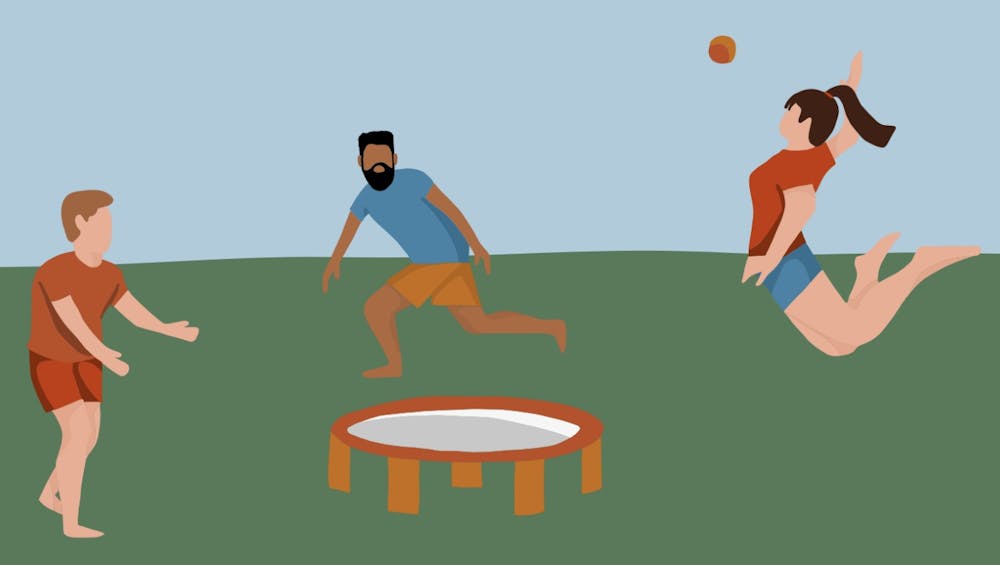Whether it be to picnic with one another, play pick-up sports games or just sit and chat, the fields outside of the Observatory Hill Dining Hall have historically been a place for first years to congregate. For many, the activity of choice on those fields is spikeball.
Spikeball, alternatively known as roundnet, is often compared to the likes of volleyball and four square. It was invented in the 1980s, but didn’t gain popularity until it was revived in 2008 and rebranded as spikeball. Since its revival, the game has skyrocketed in popularity and garnered the attention of professional athletes, notable businessmen and everyday Americans.
Spikeball Club has been an official club at U.Va. for just over five years, ever since it was founded by Class of 2016 alumnus Matthew Schwartz. At the time, the club had a few members but was not well-known around the University. It wasn’t until 2018 when Class of 2020 alumnus Alec Dolieslager took control of the club and grew it to the place it is today.
Dolieslager’s love for the game began in 2016 — right before his senior year of high school. After some time, he got hooked on the game, and shortly after arriving at the University he was added to a GroupMe with some others who liked to play too. Eventually, he had the idea to make the club official with some other students — which just involved a process of transferring club ownership to himself.
“Our idea was to create an organization that had two different aspects to it — a social side and a competitive side,” Dolieslager said in an email to The Cavalier Daily. “We wanted to foster community and create a space where people could learn how to play, meet other people and have fun. On the other hand, we also wanted to set up a space where people could get a lot better at the game and compete against other teams and colleges if they wanted to.”
And that’s exactly what they did. The club began officially operating as an active organization again in 2018 and has grown exponentially — it now has about 75-100 current active members and an impressive email list with over 600 students on it.
Dolieslager also delivered on his original intention for the club to have a social side and a competitive side. Some members compete in tournaments hosted by the club itself and by the official governing body for the sport — the Spikeball Roundnet Association — while others join in on casual pick-up games whenever they can throughout the semester.
One member, first-year College student Joe Bondi, had been playing spikeball for a few years in the backyard with his family and started playing competitively last summer. Since then, Bondi has improved immensely and is currently ranked the No. 1 roundnet player in Virginia.
“Spikeball was pretty important to me coming to college and I love [playing] it,” Bondi said.
While Bondi plays in competitive tournaments about once a month, supplemented by some games throughout the week, other members just like to play at their leisure.
First-year College student Ben Koen joined the club during his first semester at the University as a way to safely meet new people amid the COVID-19 pandemic. Unlike most extracurricular activities, Spikeball Club actually had its most active semester in the fall of 2020 because the game is typically played outdoors and therefore provided a safe way for students to socialize. The club also enforced a mask mandate throughout the semester.
“When I saw people playing it out on the fields at O’Hill, I kind of knew what the game was and I knew the rules, but I wasn’t necessarily experienced or good,” Koen said. “That just drove me to ask, ‘Hey, can I play with you guys?’ and we just started to play.”
The proximity to one of the University’s dining halls makes it easy for first years to come and start playing. Moreover, spikeball is not an extremely complicated sport, and the club prides itself on its openness to players of all ages and skill levels. Unlike other club sports, which require previous skill and a certain number of practice hours throughout the semester, there are no prerequisites or time commitments to be part of the Spikeball Club.
“Spikeball is definitely a different vibe in terms of the sporting community,” said Asher Pollack, third-year College student and club president. “The community is very open and a lot of people know one another because it’s such a niche sport.”
The wider spikeball community, characterized by its welcoming nature, fosters a space for friendships — which is reinforced by the sheer number of active members within the club at the University.
“It’s really given me a new friend group,” Pollack said. “I’ve been taking classes mostly with people above me … so meeting people younger than me has been pretty difficult, and I think [being involved with the first-year community] is very important.”
Dolieslager, Bondi and Koen also all shared that one of the best benefits from being in the club is all of the friends they’ve made.
“The sport is fun but the best part of playing is definitely meeting people,” Bondi said.
As a competitive player, Bondi could have easily said that the best part is the recognition and rankings, but instead chose to say this — a true testament to the spectacularly social nature of the club.
There’s really no doubt that Spikeball Club has been invaluable to its members, from first years to fourth years, and to the University as a whole. In the coming years, it will be exciting to see how the club grows and just how good its players can get. And who knows, one day they might even take home a national championship.
Correction: This article previously incorrectly stated that Alec Dolieslager founded the Spikeball Club in 2018 and has been updated to reflect that Matthew Schwartz founded the club in 2016.







